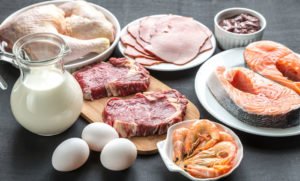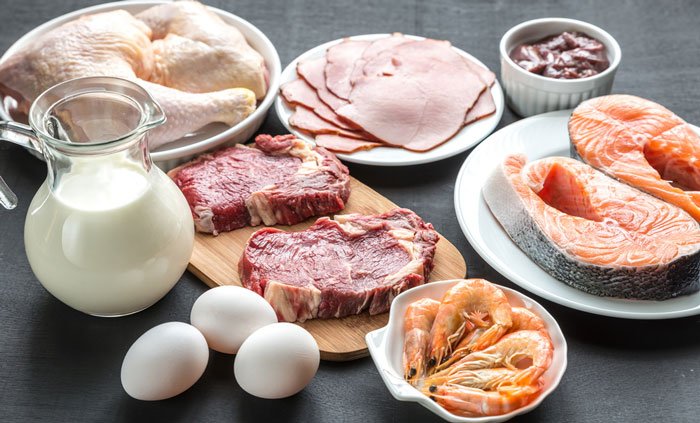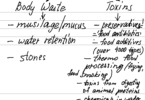
Animal Protein: Meat, Gut and B12
When people discover that I hardly eat animal products, the first question I get is “Where do you get your protein?”
A short answer is: mostly from the green leaves and my microflora in the gut.
However, the next question, according to the wide-spread point of view, is about 13 key amino acids that can be derived only from animal proteins and that a human body is not able to synthesize. The latter is the main proof-point as to why we supposedly must consume animal proteins.
Meanwhile, we cannot deny the existence of the gut microflora that plays a fundamental role in the synthesis of protein. The gut bacteria lives off the plant fibre that is NOT a source of nutrients for humans as it does not contain any protein, fat or carbohydrates.
Humans do not have ferments that would help them digest fibres like cows or other grass-eating animals do.
Microflora is bacterias. Bacterias are life: “a form of existence of Z bodies” that grow, reproduce, increase their bacterial mass and die. When they die, their bodies that consist of protein, get absorbed by the intestines’s walls and are used by the human body for the synthesis of our own protein.
Bacterias’s anatomy is much more simple than the one of the plants’s, so the substances supplied by them to our body are very animalcule. It is, therefore, easier, more optimal and natural to receive the key amino acids from microflora.
What to do though about a well-known paradox of vitamin B12 that gets absorbed in the small intestine, while a normal microflora – that is supposed to synthesise it – is located one level below it: in the big intestine?
We, therefore, cannot consider microflora to be the supplier of B12 as this vitamin is not available from plant-based sources.
How is it possible that nature could have made such a mistake?
If we think about it, modern medical science, with all respect, has never dealt with healthy individuals: all its patients adhere to what we call “the traditional eating habits”. The bodies of those patients are heavily congested. A truly healthy microflora cannot grow in such conditions.
In other words, medical science has never had a chance to research the type of microflora that was originally designed by nature.
According to Mikhail Sovetov, a Russian urologist, MD, a healthy microflora is – and I agree with this point of view – supposed to be present all way down the entire length of the intestines – both in the small intestine and in the big one!
These days, it is not possible due to the fact that the small intestine is the precise location where the mucilage from the animal protein foods and cooked plant-based foods, is originated. It hinders healthy microflora and sets in right in the small intestine.
This is where the mucilage gets stuck, inviting opportunistic pathogenic microflora to grow. No surprise that a normal (healthy) microflora migrated as further away as possible from this focality site to the lower sections of the gut: closer to the appendix.
Unfortunately, there is no formal scientific evidence of the above point of view. However, I agree with Dr Sovetov, that the nature could not possibly have made such a fundamental mistake if humans were to maintain a natural diet.
We cannot ignore the fact that a foreign type of protein is perceived by the body as a toxic invader. That is why, digestion of animal protein by our body is accompanied by aggressive toxic factors. These factors are close to those that were discussed in an earlier post about the types of congestion.
The fundamental difference between them is in their origin: animal proteins have natural origin. Our body is familiar with them and has found ways to adjust their digestion, unlike the other ones – of the chemical origin.
The induction of our nervous system after eating meat is linked to these (toxic) factors. Many people know from their own experience that after a steak meal, a person is in a better mood, feels more energy that, as a consequence, results in more aggression. It is linked to the induction of the nervous system by the toxic factors triggered by digestion of foreign proteins.
Nervous induction leads to aggression, on one hand, and to a higher blood pressure, on the other. In most cases, the people who suffer from high blood pressure, are carnivore. Vegetarians do not suffer from this condition. It is one of the very few conditions that is directly linked to meat and other animal proteins.
Toxins from meat digestion have addictive properties. That is why, people who eat a lot of meat, become addicted to it after a while and cannot imagine their life without it. Giving up meat promotes an aggressive response from them. Even talking about it, provokes a strong angry response, just like a drug addict feels hostile towards anyone who brings up the subject of his or her addiction. If we think about it, not many people argue about fish, eggs or milk, that also contain those toxins to some extent, but their amount is not as significant as in meat.
Even if we look at the ideal animal products, such as meat, fish, eggs that are grown organically, they will be toxic anyway just because they have highly concentrated amount of animal protein in them. It is, by default, a source of toxic substances.
In addition, commercially grown animals are being given shots of antibiotics to prevent them from getting leukaemia. Even if the label on a pack of meat states “organically grown”, do not have any illusions on this account, it does not mean that those animals were not injected with their shots: they could be indeed fed organically and were walking around eating grass, yet they had to get preventive antibiotics to secure the rest of the livestock from the potential illness. It is important to take it into account while thinking of switching to a healthy diet.
By all means, the amount of toxins in meat cannot be compared to the amount of chemical additives in modern foods. Yet, toxic properties of meat should not be ignored.
Ancient Korea, for instance, had an interesting type of capital punishment. A convict was given only cooked meat and water, nothing else, for 30-40 days after which he died. Clearly, he did not die due to starvation. The cause of death was intoxication.
Apart from being toxic, animal proteins also congest the body. They form the type of mucilage that is thick and water insoluble. It also has pus-like texture. This mucilage is liposolable that makes it hard for the body to get rid of.
For comparison, digesting cooked vegetables forms much more mucilage than digesting meat. But the mucilage from vegetables is not so thick and can be excreted by the body fairly easy. That is why, healthwise, eating meat has more consequences.
In an attempt to cleanse itself from the mucilage, the body initiates colds and flues: bronchitis, pneumonia, chronic nasolabial conditions (tonsillitis, pharyngitis, etc).
The mucilage is usually hard to cough out. A patient constantly has a running nose that is hard to blow.
In addition to mucilage, meat, while being digested, becomes a source of insoluble minerals – lithate (or urate) – causing the development of the joints conditions, such as podagra or uralithiasis.





